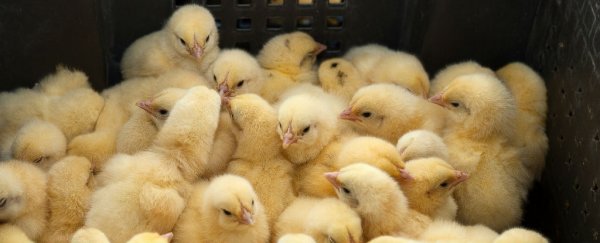It sounds like a grisly conspiracy theory, but the eggs we eat are built on the foundations of millions upon millions of day-old male chicks, which are ground up, suffocated, or gassed to death because the industry has no use for them.
The sad reality is that male chicks of egg-laying chicken breeds aren't viable meat-producers, so it's not worth it to the industry to keep them around. And while you're probably incredibly depressed right now (don't Google "chick grinding", just don't), there's finally hope. United Egg Producers, which represents 95 percent of US egg farmers, has announced plans to stop culling male chicks by 2020.
That 2020 deadline is a little tough to swallow, because it's not going to save the hundreds of millions of chicks that will be culled in the years leading up to it. But it's a change we need, and it looks like the industry is finally committed to making it happen.
United Egg Producers teamed up with the Humane League - a US farm animal protection group - to come up with the plan.
"United Egg Producers is proud to have worked with the Humane League on this commitment to support the elimination of day-old male chick culling after hatch for the laying industry," Chad Gregory, president and CEO of United Egg Producers, said in a statement.
"We are aware that there are a number of international research initiatives underway in this area, and we encourage the development of an alternative with the goal of eliminating the culling of day-old male chicks by 2020 or as soon as it is commercially available and economically feasible."
The solution to culling male chicks is a fairly simple one: if you don't 'need' them, stop them from being born in the first place. Unfortunately, the implementation of this plan is a whole lot more complicated, but researchers are confident it can be done.
In early 2015, Germany became the first country in the world to make a commitment to ending male chick culling by 2017. Their decision was based on research indicating that the sex of a chick could be determined inside the egg at a time when the embryo is thought to be too underdeveloped to feel any pain.
Spearheaded by veterinarian Maria-Elisabeth Krautwald-Junghanns from the University of Leipzig in Germany, the research suggests that unborn embryos that would become male chicks could be destroyed far more humanely than current post-hatch methods.
Germany's agriculture minister, Christian Schmidt, told the Associated Press that the method has almost been perfected and will start to be used in hatcheries from late 2016.
"He told Germany's Bild newspaper on Monday that the shredding chicks should cease by 2017, and would add no more than 2 cents to the cost of an egg," the AP reported in March 2015.
The technique US egg farmers will reportedly be pursuing is called in-ovo sexing, which involves inserting a needle into a fertilised egg to determine the sex of the chick according to slight differences in the DNA.
If an embryo is deemed to be male, it will be terminated, and the egg will be used in things like vaccine research, or pet food production. (The latter of which might sound like a bit of an undignified place to end up, but it's a whole lot better than what's currently going on.)
The reason this might take until 2020 is because "the technology is not commercially available yet - but it will be soon", David Coman-Hidy, executive director of the Humane League, told Hilary Hanson at The Huffington Post.
And here's some more good news: this partnership between industry group United Egg Producers and the Humane League isn't the start of a beautiful friendship that will see the animal welfare watchdogs soften on their fight for better conditions for egg-laying chickens in general.
The Humane League announced that while it's happy the industry has finally committed to ending the culling of male chicks, it's still not satisfied about how battery hens are treated.
Coman-Hidy said they will continue working with the industry to ensure that "cage-free" labels are more transparent for customers at the very least, and ensuring that conditions are considerably improved - something that so many of us think is important.
"It's an indicator that society is coming to recognise that farmed animals have lives, they feel pain and that they matter," he said.
